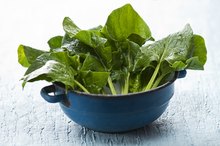The Effects of Temperature on Muscular Contraction
Temperature greatly affects the ability of muscles to contract. The temperature of your muscles is important, as well as the ambient temperature. Exercising in the cold cannot always be avoided, but an adequate warmup can help you achieve optimal muscle contraction. Proper diet is also important for maintaining healthy muscles and can help avoid injury.
Muscle Contraction
Muscle contraction is powered by the uptake of oxygen into the muscles. Oxygen is taken in through the lungs and carried to the rest of the body through hemoglobin in the blood. Each hemoglobin molecule carries four molecules of oxygen. The rate at which oxygen molecules become unbound from the hemoglobin affects the amount of oxygen in the muscles and greater oxygen levels allow for greater force of muscle contraction.
Temperature
How to Read an Underarm Temperature With a Digital Thermometer
Learn More
Temperature can greatly affect the ability of your muscle to contract. It is more difficult for muscle to contract in cold temperatures than in warmer conditions. Temperature affects the ease with which oxygen is released from hemoglobin. At cold temperatures, oxygen is more tightly bound to the hemoglobin and does not release as easily. This slower rate of release leads to a lower amount of oxygen available to your muscles, making contraction more difficult. You feel this as stiffness in your muscles. The opposite is true in warm temperatures; oxygen readily releases from hemoglobin under warm conditions, giving a steady supply of oxygen and allowing your muscles to contract easily.
Warm Up
Cold temperatures can greatly reduce the ability of your muscles to contract. Exercising with cold muscles can lead to injury, including muscle strains. Warm up your muscles before any type of exercise, even if the ambient temperature is not that cold. Gentle stretching exercises can help improve the circulation to the muscles and warm them up. This allows the oxygen to more readily enter your muscles and can prevent serious injury. Stretch the muscle groups you are about to use before each work out.
Other Factors
Difference Between Anaerobic & Aerobic Muscle Contraction
Learn More
Other factors that influence muscle contraction are diet, hydration and electrolyte balance. Your diet is important in maintaining muscle health. Eat a diet high in fruits and vegetables to ensure that you take in enough vitamins and minerals. Also, get enough protein, since protein acts as the building blocks for muscle. Proper hydration will help reduce the risk of dehydration, which can make it difficult for your muscles to contract properly and lead to injury or muscle cramping. Electrolyte imbalance can also affect muscle contraction, leading to cramping and injury. Typically, proper hydration keeps electrolytes balanced, so make sure to stay properly hydrated.
Related Articles
References
- The Journal of Experimental Biology: Effect of Muscle Temperature on Rate of Oxygen Uptake During Exercise in Humans at Different Contraction Frequencies
- Journal of Orthopaedic & Sports Physical Therapy: Effect of Temperature on Muscle Force and Rate of Muscle Force Production in Men and Women
- MedLinePlus: Strains
Writer Bio
Noelle Thompson has extensive experience with health and scientific research, including in the biotechnology/pharmaceutical industry. She graduated from the University of California, Santa Barbara, with a B.S. in cell and developmental biology. Thompson then went on to earn a Ph.D. in biological chemistry, with an emphasis on stem cell biology, from the University of California, Irvine.








